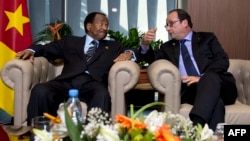French President Francois Hollande travels to Cameroon Friday — his first visit to the country. The trip coincides with growing anti-France sentiment over economic ties and controversy over why many of the weapons seized from the Nigerian terrorist group Boko Haram are of French origin.
Professor Yimgaing Moyo Theophile, president of the Citizens Movement political party, says the protest ahead of French President Francois Hollande's visit is because the French government has maintained a strong grip on Cameroon's economy through colonial agreements that stop the central African nation from seeking more profitable markets for its natural resources. He says 65 percent of Cameroon's financial reserves are kept in the French treasury, following agreements signed in 1948 when Cameroon was still a French colony
French egemony
He says bilateral agreements between France and Cameroon authorize mostly French enterprises to exploit most of Cameroon forest and mining resources even when Chinese companies propose more profitable deals. He says even the CFA franc currency used by Cameroon was pegged to the French franc in an agreement that should no longer exist because France now uses the euro, yet France still controls Cameroon's currency.
At the dawn of multi-party politics in Cameroon in 1990, Cameroon's main opposition party leader, John Fru Ndi, called for a boycott of French goods and accused France of supporting Paul Biya to stay in power for his loyalty to the French.
Professor Yimgaing Moyo says since then France reviewed its visa policies towards Cameroon. He says last year, close to 800,000 Cameroonians applied for visas to study or do business in France, but that just 7,000 Cameroonian students study in France.
Political influence
Professor Sindjoun Pokam of the University of Yaounde says Cameroonians are also angry over France's domineering role in Cameroon politics.
He says many Cameroonians are developing hatred for the French government because since the country's independence, France has always wanted to dominate Cameroon's politics by imposing people loyal to it at decision making positions.
French weapons and Boko Haram
In march this year, Chad's communication minister Hassan Sylla Ben Bakary during a visit to Cameroon said 40 percent of arms and other war material used by the terrorist group Boko Haram were of French origin.
Sindjoun Pokam says they expect France to explain to Cameroon, Chad, Nigeria and Niger how the weapons get to the terrorists.
He says people are convinced that France is responsible for terrorism in Nigeria and Cameroon because France has never issued a rebuttal that they do not supply arms to Boko Haram, even though a majority of the weapons seized are of French origin.
French Foreign Minister Laurent Fabius in a visit to Cameroon in February said he had been informed of the growing anti-French sentiments in Cameroon but strongly denied his country supports Boko Haram.
"I have been very surprised. Very surprised," he said. "When I was discussing with Madam ambassador [Christine Robichon, French ambassador to Cameroon] she told me that here, some people were saying or thinking that France was not against Boko Haram. It's a figment, a horrible figment of their imagination. If one nation, one great nation showed the world it is fighting Boko Haram it is France and there is no doubt about it."
French media
Cameroon's Minister of Communication, Issa Tchiroma Bakary, says he blames especially the French media for giving an impression relations between Cameroon and France are tensed.
He says there are many journalists, some working with RFI and France 24, criticizing relations between France and Cameroon, but that he wants to categorically state that such journalists do not speak for the French government.
Hollande, who will be visiting Cameroon for the first time as president, will spend barely four hours in the central African nation. Authorities in Cameroon say he will discuss the war against Boko Haram and social and economic ties with President Paul Biya.
